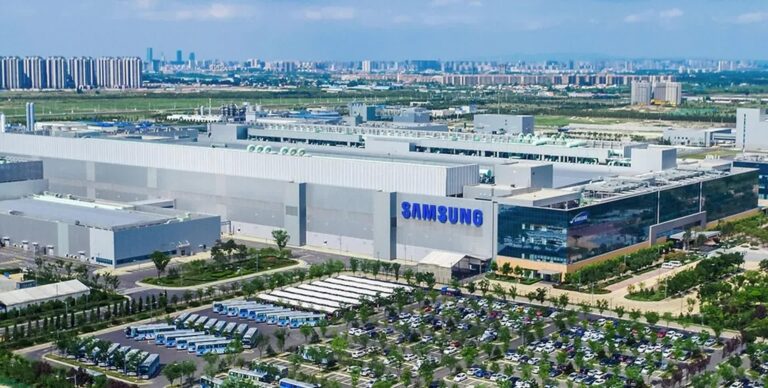The United States is reportedly considering measures that could target the operations of major semiconductor manufacturers Samsung, SK Hynix, and Taiwan Semiconductor Manufacturing Company (TSMC) within China, according to sources cited by The Business Times. The potential moves come amid escalating geopolitical tensions and ongoing concerns over technology and supply chain security. Industry experts warn that any such actions could substantially disrupt the global semiconductor market, given the critical role these companies play in the production of advanced chips. Further details on the nature and scope of the US measures remain unclear as officials and companies continue to assess the implications.
US Considers Measures Against Major Chipmakers Samsung Hynix and TSMC in China
Sources indicate that the US government is evaluating potential restrictions targeting the Chinese operations of leading semiconductor manufacturers Samsung, SK Hynix, and TSMC. This move comes amid escalating concerns about technology transfer and national security risks. If enacted, the measures could significantly impact the firms’ ability to expand or maintain their chip production facilities in China, disrupting global supply chains and technology markets.
Key points under consideration include:
- Restrictions on the export of advanced semiconductor manufacturing equipment to Chinese plants.
- Limits on research collaborations and joint ventures involving critical chip design technologies.
- Enhanced monitoring and compliance requirements to prevent intellectual property leakage.
- Potential sanctions targeting investments in semiconductor infrastructure within China.
| Company | Current China Facilities | Annual Output (Approx.) | Potential Impact |
|---|---|---|---|
| Samsung | 3 fabs | 120,000 wafers | High |
| SK Hynix | 2 fabs | 90,000 wafers | Moderate |
| TSMC | 1 fab | 70,000 wafers | High |
Potential Impact on Global Semiconductor Supply Chains and Market Stability
Any enforcement actions targeting the operations of semiconductor giants like Samsung, Hynix, and TSMC in China could trigger significant upheaval across global supply chains. These companies are integral to the manufacture of advanced chips that power a wide range of devices from smartphones to automotive systems. Disruptions could lead to:
- Supply shortages in critical semiconductor components
- Increased lead times for technology manufacturers worldwide
- Heightened volatility in global chip prices, impacting consumer electronics and industrial sectors alike
Market stability could face further erosion as investors react to the uncertainty around production continuity and geopolitical risks. The ripple effects may include a reassessment of investment flows and accelerated efforts by governments and corporations to diversify semiconductor sourcing. The table below outlines potential short- and long-term impacts on key stakeholders:
| Stakeholder | Short-term Impact | Long-term Consequence |
|---|---|---|
| Manufacturers | Production delays, rising costs | Supply chain diversification efforts |
| Consumers | Higher prices, product unavailability | Shift toward alternative technologies |
| Investors | Market uncertainty, stock volatility | Strategic reallocation, risk aversion |
Strategic Responses and Compliance Recommendations for Affected Companies
Companies impacted by potential US sanctions targeting semiconductor operations in China must prioritize agile strategic planning. This includes conducting comprehensive risk assessments to understand operational vulnerabilities, diversifying supply chains to reduce dependency on a single region, and exploring alternative manufacturing hubs. Additionally, engaging in robust stakeholder communication is crucial to maintain investor confidence and prepare for regulatory inquiries. Establishing contingency plans for production shifts and enhanced inventory management can also help mitigate disruptions in the short to medium term.
- Conduct scenario-based risk analysis for sanctions impact and compliance.
- Diversify supply chain and manufacturing locations beyond China.
- Engage with regulatory bodies for clarity on evolving compliance requirements.
- Invest in legal and trade advisory services for proactive guidance.
- Implement robust internal controls to monitor export compliance.
| Recommendation | Focus Area | Expected Outcome |
|---|---|---|
| Supply Chain Diversification | Operations & Logistics | Risk Mitigation |
| Regulatory Engagement | Compliance & Legal | Reduced Uncertainty |
| Enhanced Inventory Management | Finance & Production | Continuity Assurance |
Compliance recommendations emphasize strict adherence to evolving export controls and export licensing regulations. Affected companies should establish dedicated compliance units, enhance employee training on relevant sanctions laws, and deploy technology tools for real-time transaction monitoring. Transparency with government authorities and early reporting of potential compliance risks will be critical for minimizing penalties and reputational damage. Moreover, leveraging diplomatic channels and industry coalitions can provide collective advocacy to influence policy outcomes and facilitate smoother operational adjustments.
Implications for US-China Tech Relations and Future Policy Directions
The evolving dynamics between the US and China over technology manufacturing have far-reaching implications, especially as Washington contemplates extending its scrutiny to Samsung, Hynix, and TSMC’s operations in China. This move signals a strategic shift aimed at limiting Chinese access to advanced semiconductor technologies, which are critical for both commercial innovation and national security. The potential targeting could disrupt supply chains, lead to heightened regulatory compliance costs, and compel major chipmakers to reconsider their investment and operational strategies within the region.
Key consequences likely to unfold include:
- Increased geopolitical tension affecting global tech markets and semiconductor availability.
- Forced diversification of manufacturing bases outside China to mitigate risks.
- Acceleration of national policies in the US and allied countries to bolster domestic chip production.
- Heightened collaboration challenges among multinational corporations navigating complex export controls and compliance frameworks.
| Aspect | Potential Impact |
|---|---|
| Samsung’s China Operations | Risk of production slowdowns and increased compliance scrutiny |
| Hynix’s Market Share | Possible reduction due to export restrictions |
| TSMC’s Global Strategy | Shift towards expanded fabs in Taiwan and the US |
| US Policy Direction | Stronger export controls and investment in domestic semiconductor resilience |
To Conclude
As the U.S. government weighs potential measures against key semiconductor manufacturers Samsung, SK Hynix, and TSMC operating in China, the move signals escalating tensions in the global technology supply chain. Industry observers will be watching closely for official announcements, as any restrictions could have far-reaching implications for the semiconductor market and international trade relations. Stakeholders across the tech and geopolitical spectrum are expected to brace for potential shifts stemming from Washington’s evolving strategy.




